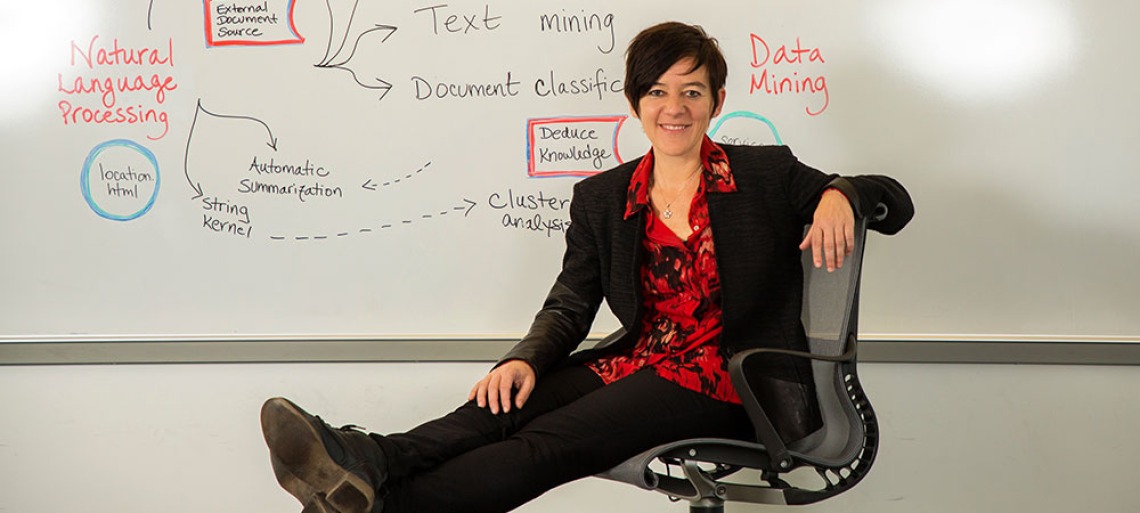Gondy Leroy, Professor of Management Information Systems
Seven Questions with Gondy Leroy

"I have worked with students at all levels, both in my classes and my research, and I love the creative energy they bring and their optimism about their future."
What brought you to the Eller College?
The MIS department is a top department where faculty members can focus on a wide variety of research topics. The emphasis is on doing excellent research and not on doing work that fits a certain mold. That was very attractive to me, and also a good fit, since my work is design science research with several active projects in the healthcare domain. I also believe that multidisciplinary teams can tackle much larger and more interesting problems. So, the opportunity to come to Eller was even more interesting because it would enable me to collaborate with people in a variety of disciplines across campus.
How long have you been at Eller?
I have been here almost four years. I arrived in the fall of 2013.
What is your current research, and what most excites you about that area of focus?
My research focuses on improving the use of and facilitating access to information in unstructured text for a variety of purposes. What excites me about this research is that I am trying to solve real, practical but difficult problems.
For example, in the medical domain, one project focuses on automated translation of difficult medical text into easier versions to help improve patient comprehension. We are different from all other research groups because we use a data-driven approach to discover how to simplify text and we measure the impact of any change with user studies. Another project focuses on automated processing of electronic health records of children with autism. The prevalence of autism is rising and it is not understood why. Our research focuses on processing records automatically and finding individual diagnostic criteria, while also classifying records as that of a child with or without autism. This will facilitate analyzing millions of records to find changes and trends or to combine recorded data with the information from other sources.
I have also worked on crime-related projects. The Internet’s popularity and anonymity have led to a large volume of text that is available to law enforcement from witnesses of crimes. We worked on automating the extraction of relevant information from such witness reports. We went a step further and developed an automated interview process with good results. While my recent work focuses on healthcare, I intend to return to this work again. It may be helpful in tackling human trafficking or cyber bullying.
What are you currently teaching, and what do you most enjoy about teaching?
I teach two master’s level courses and a doctoral level course. What I enjoy most is the outcomes of my courses: students often stop by my office to tell me how their course projects or independent studies helped them during their job interviews. It is even better when they get the job they wanted!
How do you bring your research into your teaching?
My research and teaching are closely related. Through my research, I stay up-to-date on development of new algorithms in data and text mining. Algorithms that become mainstream and made available through software become components of the master’s level courses. The newest algorithms, not yet discussed in text books, are discussed in the doctoral level courses.
Beyond research and teaching, what are your passions?
I have two main passions. One is equality of women in the workforce. Fortunately, I can integrate this passion in my work. For example, I created the Tomorrow’s Leaders Equipped for Diversity Program to help promote diversity and inclusion among Eller students, and I have also been able to provide funds for several UA students to attend the Grace Hopper Celebration of Women in Computing. My second passion is the outdoors and animals. I have backpacked or hiked most of the national parks in the Southwest and I am a volunteer at the Humane Society of Southern Arizona.
What does the Eller Experience mean to you?
I find the Eller community to be warm and welcoming. Through some committee work and attending research seminars, I’ve had the opportunity to get to know several of my colleagues in other Eller departments and it’s been a good experience. I’ve also worked with students at all levels, both in my classes and my research, and I love the creative energy they bring and their optimism about their future.

